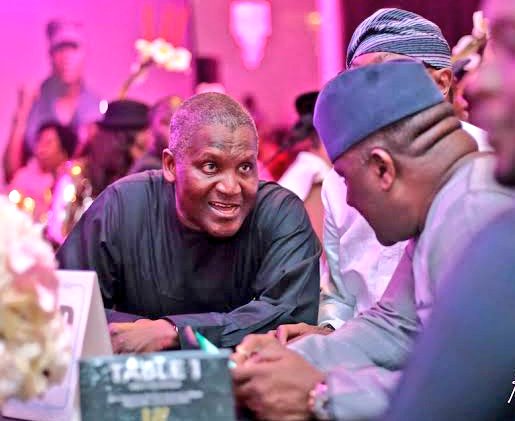Featured
The Nigerian billionaires’ war, between Aliko Dangote and Abdulsamad Rabiu of BUA

The Nigerian business landscape has witnessed a media war (and the first bullet fired) between two of some of its biggest players, Nigerian famous billionaire businessman, Femi Otedola has accused his colleague, Tony Elumelu of backstabbing him to buy his Transcorp Plc shares when he (Otedola) was bankrupt.
Otedola said this in a press statement on Tuesday, saying he proposed to buy Transcorp Plc for N250billion, bringing the company’s market value to N2trillion, but his bid was rejected.
We thought to remind our readers, that Tony and Otedola are not alone, in recent years, we recall, Aliko Dangote and Abdulsamad Rabiu, the founders of Dangote Group and BUA Group, also had a messy face-off respectively. The feud, which played out in the media, had been marked by accusations and counter-accusations, with each side seeking to gain the upper hand in the competition for market share.
The roots of the feud can be traced back to the cement industry, where both Dangote and BUA are major players. Dangote Cement, a subsidiary of Dangote Group, is the largest cement producer in Nigeria, while BUA Cement, a subsidiary of BUA Group, is the second-largest. In recent years, the two companies have been locked in a battle for dominance in the market, with each side seeking to gain an edge over the other.
The feud began in 2017 when BUA Group was accused of operating an illegal cement plant in Okpella, Edo State. Dangote Group, which had a monopoly in the cement industry at the time, accused BUA of flouting regulations and operating without the necessary licenses. BUA denied the allegations and accused Dangote Group of attempting to stifle competition.
The situation escalated in 2020 when BUA announced plans to build a new cement plant in Sokoto State. Dangote Group, which had previously announced plans to expand its own cement plant in the state, accused BUA of stealing trade secrets and infringing on its patents. BUA denied the allegations and accused Dangote Group of trying to monopolize the market.
The feud played out in the media, with both sides using various channels to promote their interests and discredit their rivals. Dangote Group had used its vast resources to launch a media campaign against BUA, accusing the company of various infractions and seeking to paint it as an illegitimate player in the market. BUA, on the other hand, used its own media channels to defend itself and accuse Dangote Group of using its monopoly power to stifle competition.
The media war between Dangote and BUA has had far-reaching consequences for the Nigerian business landscape. It has highlighted the need for a level playing field and fair competition in the market, and has exposed the challenges faced by new entrants seeking to break into established industries. It has also raised questions about the role of the media in business disputes and the ethics of using media channels to promote one’s interests.
The media war between Dangote and BUA is a reflection of the intense competition that exists in the Nigerian business landscape. While the feud has highlighted the challenges faced by new entrants seeking to break into established industries, it has also highlighted the need for fair competition and a level playing field.






